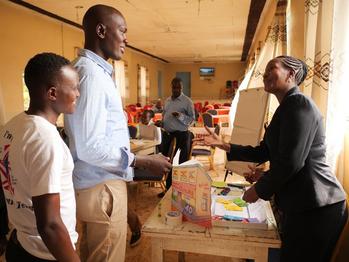Context
Kenya’s agricultural sector is characterised by small-scale farms. Smallholders produce around 75 per cent of the country’s food – largely for their own use. The rapidly growing population, especially in towns and cities, coupled with the impacts of climate change and the scarcity of both land and water are threatening natural resources and present major challenges for Kenya’s agricultural and food sectors. The high level of youth unemployment and a lack of services in rural areas are causing young people mindful of their futures to migrate to towns and cities.
The political institutional landscape has changed radically in the wake of the decentralisation process launched in 2013. Responsibility for agricultural services rests with newly created county governments. This affects agricultural extension services and training in particular. Cooperation between the authorities at national and county level still has room for improvement. In addition, the role of the national level in ensuring the continuing development of resources and capacities of the agricultural services at county level needs to be consolidated.
Objective
Key institutions for agricultural development, above all at national level and in the counties of western Kenya, promote sustainable agriculture that contributes to food security.
